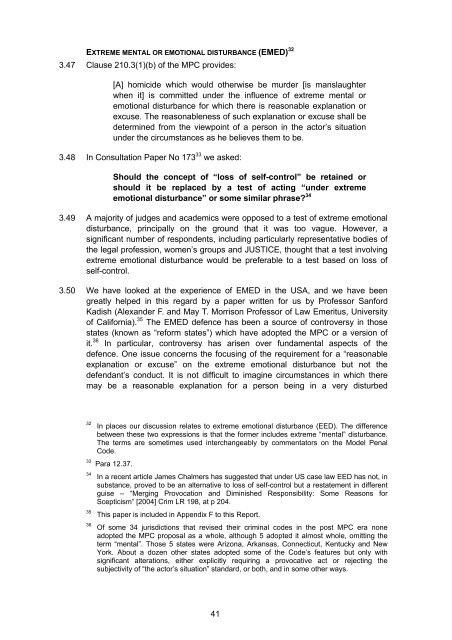lc290 Partial Defences to Murder report - Law Commission
lc290 Partial Defences to Murder report - Law Commission
lc290 Partial Defences to Murder report - Law Commission
You also want an ePaper? Increase the reach of your titles
YUMPU automatically turns print PDFs into web optimized ePapers that Google loves.
EXTREME MENTAL OR EMOTIONAL DISTURBANCE (EMED) 32<br />
3.47 Clause 210.3(1)(b) of the MPC provides:<br />
[A] homicide which would otherwise be murder [is manslaughter<br />
when it] is committed under the influence of extreme mental or<br />
emotional disturbance for which there is reasonable explanation or<br />
excuse. The reasonableness of such explanation or excuse shall be<br />
determined from the viewpoint of a person in the ac<strong>to</strong>r’s situation<br />
under the circumstances as he believes them <strong>to</strong> be.<br />
3.48 In Consultation Paper No 173 33 we asked:<br />
Should the concept of “loss of self-control” be retained or<br />
should it be replaced by a test of acting “under extreme<br />
emotional disturbance” or some similar phrase? 34<br />
3.49 A majority of judges and academics were opposed <strong>to</strong> a test of extreme emotional<br />
disturbance, principally on the ground that it was <strong>to</strong>o vague. However, a<br />
significant number of respondents, including particularly representative bodies of<br />
the legal profession, women’s groups and JUSTICE, thought that a test involving<br />
extreme emotional disturbance would be preferable <strong>to</strong> a test based on loss of<br />
self-control.<br />
3.50 We have looked at the experience of EMED in the USA, and we have been<br />
greatly helped in this regard by a paper written for us by Professor Sanford<br />
Kadish (Alexander F. and May T. Morrison Professor of <strong>Law</strong> Emeritus, University<br />
of California). 35 The EMED defence has been a source of controversy in those<br />
states (known as “reform states”) which have adopted the MPC or a version of<br />
it. 36 In particular, controversy has arisen over fundamental aspects of the<br />
defence. One issue concerns the focusing of the requirement for a “reasonable<br />
explanation or excuse” on the extreme emotional disturbance but not the<br />
defendant’s conduct. It is not difficult <strong>to</strong> imagine circumstances in which there<br />
may be a reasonable explanation for a person being in a very disturbed<br />
32 In places our discussion relates <strong>to</strong> extreme emotional disturbance (EED). The difference<br />
between these two expressions is that the former includes extreme “mental” disturbance.<br />
The terms are sometimes used interchangeably by commenta<strong>to</strong>rs on the Model Penal<br />
Code.<br />
33 Para 12.37.<br />
34 In a recent article James Chalmers has suggested that under US case law EED has not, in<br />
substance, proved <strong>to</strong> be an alternative <strong>to</strong> loss of self-control but a restatement in different<br />
guise – “Merging Provocation and Diminished Responsibility: Some Reasons for<br />
Scepticism” [2004] Crim LR 198, at p 204.<br />
35 This paper is included in Appendix F <strong>to</strong> this Report.<br />
36 Of some 34 jurisdictions that revised their criminal codes in the post MPC era none<br />
adopted the MPC proposal as a whole, although 5 adopted it almost whole, omitting the<br />
term “mental”. Those 5 states were Arizona, Arkansas, Connecticut, Kentucky and New<br />
York. About a dozen other states adopted some of the Code’s features but only with<br />
significant alterations, either explicitly requiring a provocative act or rejecting the<br />
subjectivity of “the ac<strong>to</strong>r’s situation” standard, or both, and in some other ways.<br />
41

















